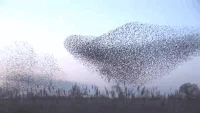“Loving the original ship does not mean loving the barnacles . . . In the grip of Enlightenment individualism, pietism, sentimentalism, and so forth, in our day the meaning of the solas has been turned aside from their original and more glorious meaning. Now they are solo Christus (just me and Jesus), solo gratia (narrow, sectarian grace), solo fide (when ‘I prayed the prayer’), solo Scriptura (just me and my Bible), and solo Deo gloria (God gets all the glory for saving me, and maybe somebody else. Now please realize that the word solo here constitutes a bad macaronic pun, and not a serious attempt to match gender, number, and case. No letters from the Latinists, please.”
Bottle-Rocket Doctrine
“In fact, one of the guys we lost to Rome wasted very little time in denouncing John Paul II as a heretic and discovering that the papal throne was empty. All such things remind me very little of classic Roman Catholic doctrine and remind me a great deal of bottle-rocket anabaptism.”
On Walking Along the Balance Beam of, You Know, Balance
Introduction: I was recently interviewed by Religion News Service and by some friends at New Founding, and in both interviews the same issue came up. As a consequence, it naturally occurred to ...
Christians Becoming True Christians
“A man who is married to a woman is obligated to be faithful to her. But if he is not faithful to her, this does not mean that he is not ‘really’ married to her—because that would mean, ironically, that he was not really being faithless to her. You have to be covenantally obligated to be covenantally faithless . . . If a cheating husband repented and came home to his wife after years of infidelity, and she forgave him, and said to him, ’Today, you have become my husband,’ we would all know what she meant. He had to have been a husband before his repentance in order to cheat, but when he repented of cheating, he ‘became a husband.’ A lot of faithless covenant members have ‘become Christians’ the same way.”
Letters That Express Your True Feelings
Letter to the Editor: Re: Sly Dog Teachers I'm glad I'm not the only one who noticed (and doesn't appreciate) the word "winsome" creeping into Christian teaching. I've heard it on Christian ...
But Enough About John Murray
“Not to put too fine a point on it, a man might be rejected by the current folks at Banner of Truth because he teaches things that he learned from a Banner of Truth book.”
The Prodigal Son and Christian Nationalism
Introduction: What it all comes down to is that America needs an intervention. Suppose a loved one in your family decides to go on a bender, let's say, and it lasts for a couple weeks longer than it ...
Not a Univocal Cup
“When Paul tells us about the cup of blessing which was the cause of many Corinthians getting sick and dying, is he intending to tell us that it is a blessing to get sick and die under the judgment of God? Or is he speaking about blessing at one level, and then when we get to the specific problems at Corinth, he addresses the situation at another level?”
Now That’s Real Nice . . .

Faith Closes the Circle
“If I can only believe what is propositionally revealed in the Bible, and if my name is not propositionally revealed in the Bible as one who believes the promises of salvation rightly, then how can I believe the promise? How can I believe any promise there? Do I have direct warrant? No, not at all. I can, however, believe indirectly, but I must supply one of the missing ingredients (which I cannot do apart from grace) . . . The thing that closes the circle is always faith. This particular faith cannot be based on propositional warrant from Scripture, because Scripture says nothing about my prayers, nothing about my children, nothing about whether I am elect. I close the circle by faith. God gives the general enscripturated promise. He then works in me specifically through the person of the Holy Spirit to bring me to the conviction that these general promises are mine, and so that I may enter into rest. Not only do I have reason to believe the promises, I am commanded to believe them”




